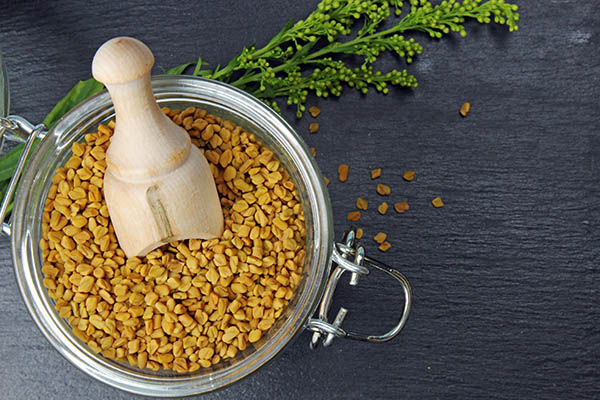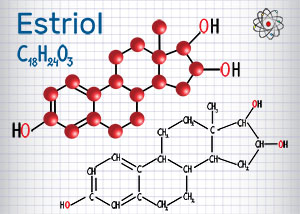
Everyday Chemicals Are Screwing Up Your Testosterone
You may have already read my other article on 7 habits which are killing your testosterone. There was a section in that on Water because

Fenugreek, is a plant native to South Asia and it’s seeds and leaves are frequently used in curry dishes. It has some great medicinal properties that we will discuss later.
It might also be the most popular and over-hyped testosterone boosting ingredient on the market today. Various methods of extraction have been patented and marketed with very clever names such as “Testofen”.
Patenting extractions is not always, but often times a clever way to make someone feel like they are getting something special or unique and therefore a higher price tag can be slapped on the cleverly marketed product.
Interestingly, Nugenix, who helped bring Testofen to popularity, uses plain ole Fenugreek extract instead of Testofen in their flagship product, Nugenix “Ultimate Testosterone”.

The short answer is no, fenugreek does not boost either free or total testosterone levels according to the scientific evidence at hand.
Unfortunately, it seems that most supplement companies start their ingredient formulations in the marketing room instead of with scientific data.
The study that started the firestorm of interest in fenugreek as a testosterone booster spread throughout the bodybuilding community almost overnight.
What nobody bothered to mention, was that the company which sponsored the study was actually a manufacturer of the product. Can you say “red flag”?
This study was primarily questionnaire based as in the “how do you feel?” sort of way that is really arbitrary.
What is even crazier is the study didn’t even mention testosterone being boosted long term. In fact, they found that T levels remained basically unchanged throughout the study!
In the researchers own words “may assist to maintain normal healthy testosterone levels” but they made no mention of actually increasing levels so it’s a bit of a strange conclusion to draw. (1)
Since that time, another study published in the Journal of the International Society of Sports Nutrition showed no influence in free or total testosterone levels from fenugreek extract. (2)
In fact, it showed that DHT levels actually decreased which if you are looking to increase size, strength or libido is not something you want to happen.
There are some major health websites reporting a study on athletic men who supplemented with fenugreek and saw a significant increase in free testosterone.
This is absolutely NOT TRUE!
We already highlighted this same study (2) and it clearly states there was no significant increase in free testosterone in humans.
Unfortunately the “doctors” and “nutritionists” writing these articles for these major publications are either purposely misleading you; or are simply not able to (or willing to) read the actual case study they are showcasing.
I advise you to read the study for yourself though, especially the following sentences in the conclusion:
“Although a between group difference was noted for free testosterone at T2 and T3, it has limited relevance due to the fact that it did not significantly change over time… 500 mg commercially available supplement in conjunction with a resistance training program has no anabolic effect on the hormonal status of resistance trained males.”

Fenugreek “may” help increase strength but it probably doesn’t.
In 2011 a study was done on 47 males to test if the combination of fenugreek and creatine would increase strength over an 8 week resistance training program.
The men were given one of three supplement combinations:
If you are not familiar with dextrose is a simple sugar so it should have absolutely no bearing on gaining strength (although it may enhance the effects of creatine when they are combined).
At the end of the study, the researchers concluded the combination of “creatine with fenugreek” and “creatine with dextrose” were similarly effective at increasing strength while the placebo group did not see a significant increase.
The common denominator here of course is creatine. It increased strength equally whether it was paired with either fenugreek or dextrose.
It’s been extremely well documented that creatine boosts muscle strength and weightlifting performance. (4)
So does that study really leave you believing fenugreek is going to help increase your strength? It sure didn’t convince me and neither did a trial run I gave myself taking just fenugreek as a supplement.
Once again the main study which pointed to an increase in libido was paid for by a manufacturer of fenugreek and was the paid questionnaire.
After six weeks, the score for sexual arousal rose from 16.1 to 20.6
There is quite a bit of anecdotal evidence fenugreek may increase libido in men but if that is your goal there are better herbs suited for increasing your sex drive such as Horny Goat Weed.

Two different studies suggest fenugreek can increase lactation in breastfeeding women. (5, 6)
In fact, my wife actually took it as a supplement after my son was born to help pump out more breast milk and she would swear by its effectiveness.
It is said to stimulate the milk ducts in as little as 24 hours and is usually recommended to take around 3,500 mg per day for maximum lactation.
However, if you are reading this article that was probably not the benefit you were looking for!
If you stumbled across this blog by accident though and you really did want to find out about lactation or if you are expecting a new addition to the family soon, I suggest you check out Kelly Mom’s Article on it.

Well that could be a problem!
Two different studies, one In Vivo (petri dish) on human cells and one on rats showed that fenugreek may increase estrogen levels. (7,8)
I stress in my posts that you have to look at the human case studies when looking at outcomes because what happens to rats or primates and what happens in petri dishes often have different outcomes in actual human trials.
However, I do feel this is worth mentioning because we already know that high doses of fenugreek can increase lactation so even though these studies are far from conclusive, they do give pause for concern.
Most people do not experience significant side effects with fenugreek supplementation but just about every natural herb, vitamin or mineral has the potential to cause some side effect in particular individuals with low tolerance.
Side effects particular to fenugreek may include:
While it may cause an upset stomach in some individuals (this seems to be the most frequent complaint) it has actually been successfully used to treat digestive issues in others.
Overall, you aren’t likely to experience any major side effects but you may want to start with a smaller dose to see how your body reacts to it first.
As for the sensitive nipples issue, you might think this would primarily affect women since it can increase lactation but it’s actually a pretty big complaint in bodybuilding forums among men.
Fenugreek is a rich source of phytonutrients and saponins so it is definitely healthy for you overall and in fact, if your goal is simply to boost your overall health it is great for men to take.
With that said if your goal is to increase testosterone, the science behind the claims just do not add up.
Find out what vitamins, minerals and herbs will work. Check out our article on the best natural testosterone boosters!
Force X7 is based off of human backed case studies so you can be sure you are getting both healthy and powerful ingredients.
In fact, we formulated Force X7 with 13 different vitamins, minerals and herbs designed to work in harmony and address several key areas to help boost your testosterone levels.
Our lead product developer Robert Clark is extremely proud of this product and we know when you compare it to everything else out there are on the market today, you are going to be just as impressed by what is in Force X7; as by what we didn’t put in it! (Hint: No Fenugreek)
References:

You may have already read my other article on 7 habits which are killing your testosterone. There was a section in that on Water because

Rhodiola Rosea stands out as a potent adaptogenic herb with a rich history of traditional use and a growing body of scientific research. Revered for

In this comprehensive article, we will explore what L-tyrosine is, its benefits as a pre-workout supplement, the correct dosage, and other potential health benefits it

Betaine anhydrous is becoming an increasingly popular ingredient for pre-workouts. In this article, we will explore the fundamentals of betaine anhydrous, its connection to carnosine,

Beta-alanine is a pre-workout powerhouse. From boosting workout performance to potential anti-aging effects, discover why this amino acid is a favorite among health buffs.

You may have already read my other article on 7 habits which are killing your testosterone. There was a section in that on Water because

Rhodiola Rosea stands out as a potent adaptogenic herb with a rich history of traditional use and a growing body of scientific research. Revered for

In this comprehensive article, we will explore what L-tyrosine is, its benefits as a pre-workout supplement, the correct dosage, and other potential health benefits it

In the ancient wilderness, a legendary creature prowled the untamed lands—a fierce and noble Alpha Wolf. This majestic beast possessed an aura of strength and resilience, leading its pack with unwavering authority.
In a parallel realm, a group of visionary alchemists delved into the mysteries of nature, seeking to create potent elixirs that could unlock the true potential of those who dared to embrace their inner power.
As fate would have it, these paths crossed, and an extraordinary alliance was forged. The Alpha Wolf and the alchemists found common ground in their pursuit of greatness, and thus, Alpha Wolf Nutrition was born.
United by a shared passion for excellence, the Alpha Wolf and the alchemists dedicated themselves to crafting supplements that harnessed the raw force of nature, empowering individuals to conquer their inner and outer worlds.
At Alpha Wolf Nutrition, we draw inspiration from the primal instincts of the Alpha Wolf—the embodiment of strength, leadership, and vitality. We believe that every individual possesses a dormant power within, waiting to be awakened.
Through our meticulously crafted products, we strive to unleash this dormant potential, allowing you to thrive in the face of challenges and embrace your true nature.
Our commitment lies in providing you with the highest quality, scientifically proven ingredients, carefully curated to deliver optimal results. We leave no room for guesswork, basing our formulations on human-backed research to ensure real, tangible benefits. With us, you’ll find no “proprietary blends” or token additions—just pure, effective dosages that fuel your journey to greatness.
Join the pack of Alpha Wolves and embark on a transformative journey with Alpha Wolf Nutrition. Embrace your inner strength, rise above the ordinary, and conquer your aspirations. Unleash the power within and let the spirit of the Alpha Wolf guide you to achieve your highest potential. Welcome to Alpha Wolf Nutrition, where the path to greatness awaits.

Alpha Wolf Nutrition is based on real science and results for the people we serve.
We do not cut corners, we do not hide behind “proprietary blends” and we do not put in worthless amounts of token ingredients to fill up a label.
What we do, is kick ass!

© 2016 – 2023 Alpha Wolf
Discount Applied Successfully!
Your savings have been added to the cart.